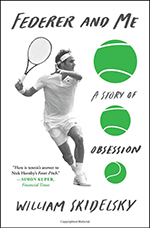The Psychological Effect of Nadal
William Skidelsky

My friend Ben, who once wrote an article explaining why he disliked Federer, has a theory about the Swiss. He thinks he's a bully.
When, early in his career, he was easily the best player in the world, he happily trampled over all comers. But against those who have stood up to him--first Nadal, then, to a lesser extent, Djokovic and Murray--his record has been less impressive. Ben says Federer is happy to dole it out, but can't take it. He's a good winner but a poor loser.
Like all bullies, he's a coward who lacks true grit, true courage, who preens and flexes and gangs up on the weaklings and then runs off crying when the big boys show up. Ben says Federer is happy to dole it out, but can't take it. He's a good winner but a poor loser.
Ben additionally says that great champions "find a way," and that, against Nadal, Federer has failed to do this. And here, I'll admit, he has a point.
Over the years, what has perplexed me most when Federer plays Nadal is how rarely the Swiss has appeared capable of truly battling. Something about playing Nadal seems to reduce Federer, make him indecisive and tactically brittle.
I have lost count of the number of times their matches have followed the same basic pattern. In the first set, things look good; Federer comes out with an aggressive game plan, and executes it well. He breaks Nadal's serve, looks on top.
Then he goes for a bit too much, and misses a key shot, or else Nadal pulls off an extraordinary defensive winner. And from then on, the dynamic changes. Confidence drains from Federer; Nadal becomes pumped up, inspired. Federer starts making unaccountable errors--generally my cue for exiting the room in despair. He may threaten Nadal again, but he never gets back on top. He can't raise his game when he really needs to.

It's not that, in general, Federer is mentally frail. Despite his reputation for being a front runner, he can dig his heels in, be gritty and obstinate. He wins an awful lot of matches simply because he plays the big points better than his opponents. Against Nadal, though, such steeliness deserts him.
Not always, of course: the pair have had some epic battles over the years--their second meeting in Miami, the 2007 and 2008 Wimbledon finals, the 2009 Australian Open final. In those matches, even when Federer lost, he really fought, and emerged with credit. But there have been many other occasions, particularly in recent years, when Federer hasn't appeared interested in really fighting Nadal, as if, deep down, he'd resigned himself to losing before the match even started.
At times it has seemed as if Federer would prefer to surrender meekly to Nadal than give his all and still come out second best. Mats Wilander once said of Federer-after he'd lost a match to Nadal--that he'd "come out with no balls." Though the phrasing isn't attractive, the sentiment might be right.
What explains this strange capitulatory tendency, so out of character for Federer generally? I've never quite understood it, and nor have I heard anyone else account for it satisfactorily.

All I can do--like anyone else--is speculate. And my best shot at a theory is that, at some point, Nadal inflicted an injury to Federer's ego that the Swiss has never fully recovered from.
It's important to remember that Nadal has never been afraid of losing to Federer. Early on, he was the underdog anyway, and even now he takes the attitude that Federer, on his day, is naturally a better player than him, that he could lose. Thus, his expectations against the Swiss are carefully managed.
Flip the equation round, however, and it's not the same. Federer, as I've pointed out, is a sporting aristocrat, someone who believes that he's got the shots to win, that victory is "on his racket." And in his early twenties, when he was dominating, there was little to contradict this.
Then Nadal came along, and suddenly the situation changed. Here was player who could soak up Federer's aggressive shots, retrieve balls no one else could, make Federer feel that he had to do something extra to win.
For a while, perhaps, this wasn't too disastrous. Nadal may have had Roland Garros and the entire clay court season, sewn up, but Federer was still world No. 1, was still winning at Melbourne, Flushing Meadow, Wimbledon.
Couldn't he beat Nadal on grass (as in 2006 and 2007) and, if it really came down to it, fend him off on hard courts, too? That must have been the belief that Federer sustained himself with; and while it remained untested, it was plausible enough.

But then, in 2008-2009, the situation changed. Nadal finally conquered Federer at Wimbledon, and, six months after this, almost more devastatingly, beat him in similarly dramatic fashion in the Australian Open final, a defeat that famously prompted Federer to cry.
It was as if everything Federer considered his had been taken away from him. He had been overthrown, thoroughly colonized.
In the grand scheme of things, to be deposed in a sporting sense--to go from being the best in the world to being the second best may not seem like too dreadful a fate.
And Federer, unlike, say, Borg, didn't go to pieces; he hung around, adapted to the reality of post-dethronement life.
But much of Federer's career since then has somehow had the air of an aftermath, an anticlimax. It will forever be the case that, when the greatest test came, he wasn't quite up to the challenge.
Pundits talk--incessantly, infuriatingly--about the "old Federer," and what they surely mean by this is the Federer who once played with the freedom of knowing that, if he played his best, no one could touch him. That Federer—for all that he has reemerged periodically in recent times—can never be fully recaptured.

He is a memory, a chimerical presence. Around 2008 and 2009, the infinite became limited. There was a cruel reduction in scale.
The gravest psychological blows--the ones least easily borne--are those that force a person to change the way he sees himself, that destroy a much-cherished self-image. How exactly Federer coped with those losses to Nadal--how he justified them to himself--is something that only he, and perhaps those closest to him, know.
But ever since, Federer has been a different player when he steps on court with Nadal. In some sense, he has been psychologically cowed. And one consequence is that their rivalry, which initially burned so fiercely, has never quite lived up to its promise.
Again, though, in a larger sense, all this could be seen as necessary. The aura of perfection, of godliness, that clung to Federer during his best years needed to be dispelled.
It wasn't good for the sport, maybe not good even for Federer himself. Something had to be done, and the gods of tennis duly obliged. Having (presumably) scratched their heads for some time, they sent down the one thing capable of stopping Federer--a messenger from a future gone wrong, an embodiment of every crudifying technological development of the previous four decades, a player who, with one 4,000-rpm smote of his racket, could smash all Federer's artistry, his subtlety, to pieces. Nadal, one could say, was the price tennis had to pay for Federer's genius.





